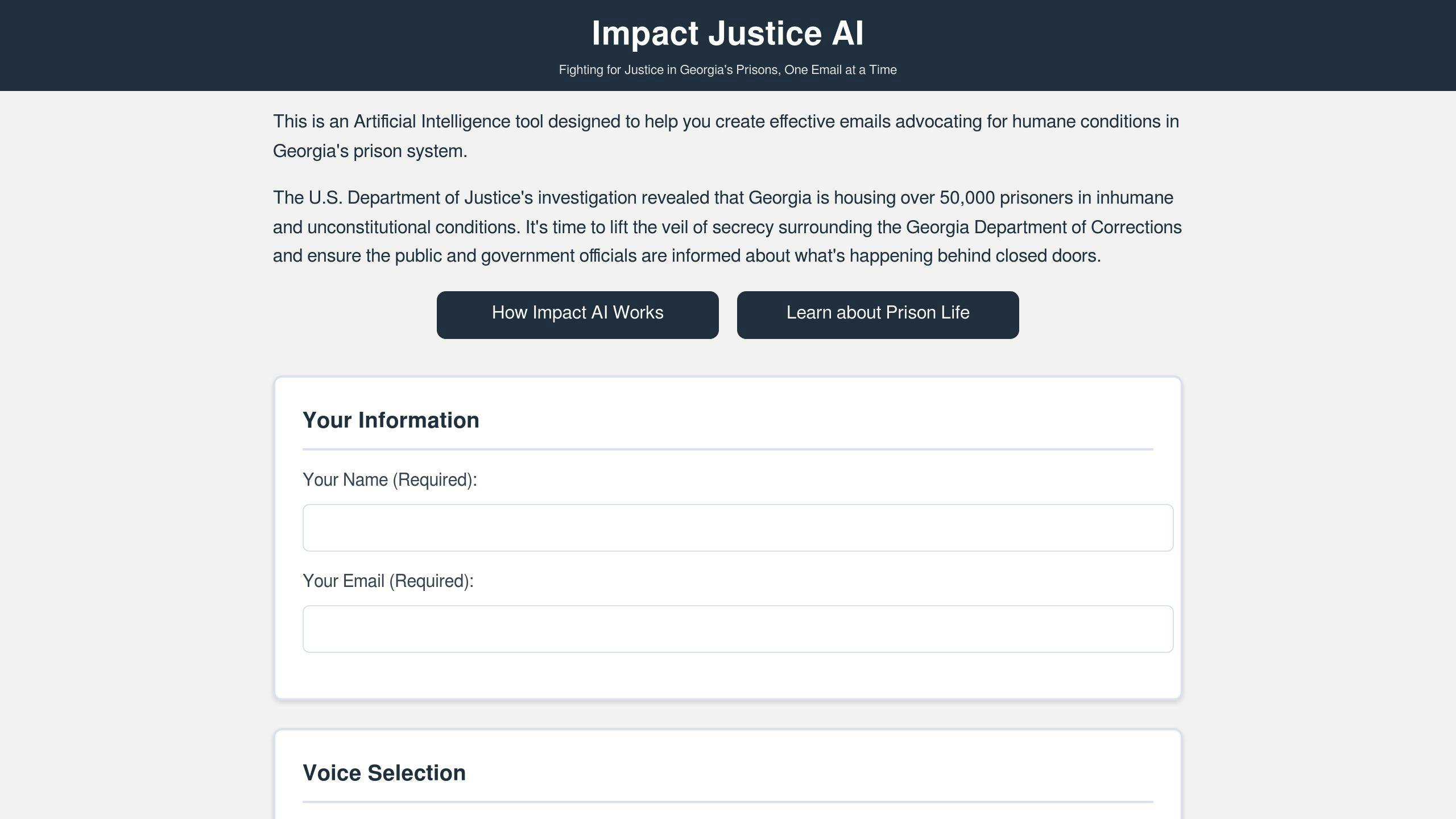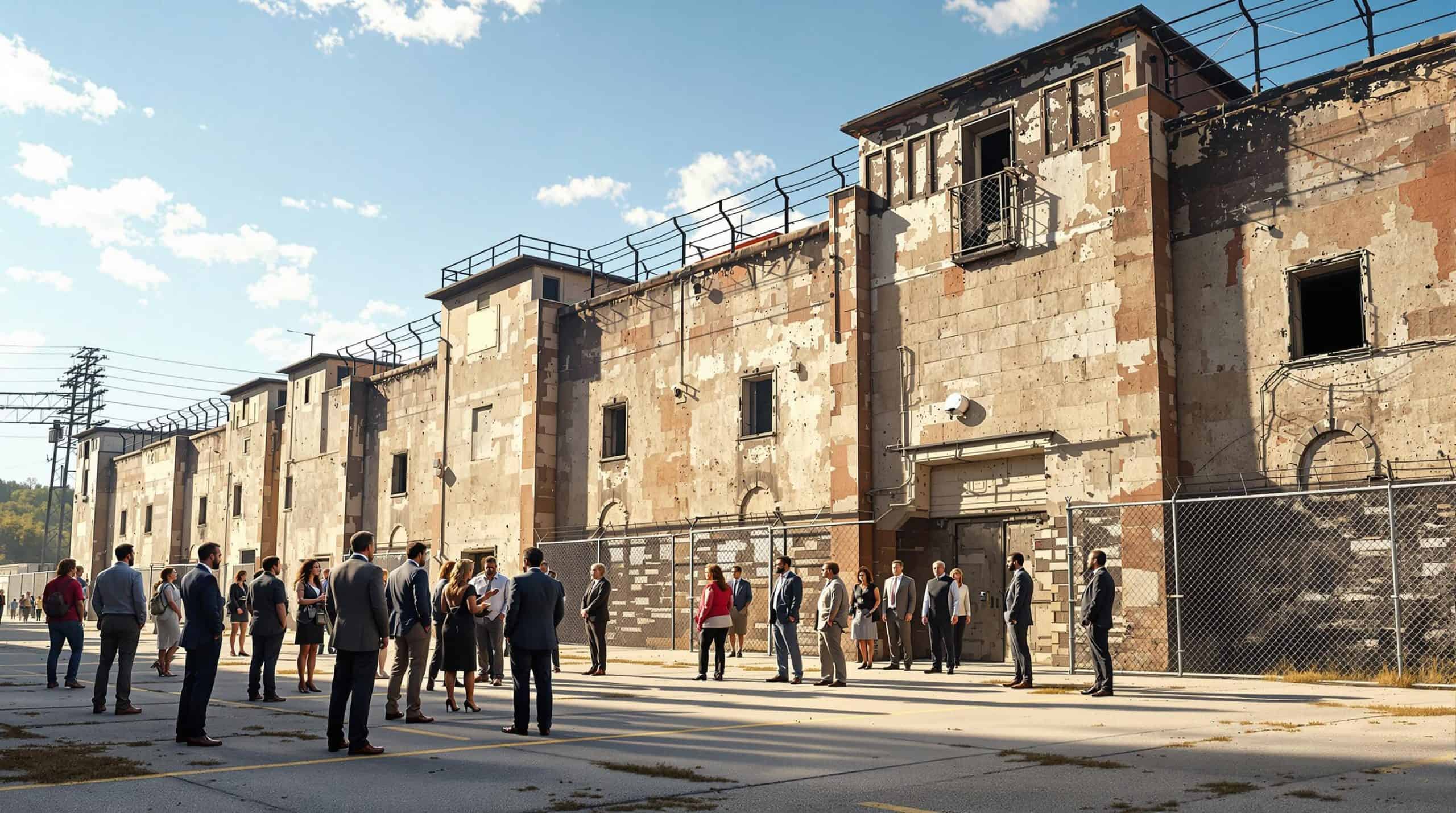Georgia’s prison system is in crisis. Violence has surged, with homicides rising from 7 in 2018 to 35 in 2023, and 18 more recorded in the first five months of 2024. Nearly half of correctional officer positions remain unfilled, leaving facilities dangerously understaffed. The Georgia Department of Corrections (GDC) has been accused of hiding critical information, underreporting incidents, and failing to address systemic issues like gang violence, drug use, and poor healthcare.
Key Issues at a Glance:
- Violence: Homicides have tripled since 2018, with 18 killings in early 2024 alone.
- Staffing Crisis: Nearly 50% of officer positions are vacant, some facilities at 70% vacancy.
- Healthcare Failures: A $2.4 billion healthcare contract has increased costs but failed to improve care.
- Transparency Issues: GDC withholds key data, downplaying the true scale of violence and neglect.
Lawmakers must act now by enforcing transparency, establishing independent oversight, and addressing core issues like staffing and healthcare. Without these changes, public safety, taxpayer money, and human lives remain at risk.
The Truth Behind Georgia’s Prison Crisis
Escalating Violence and Neglect
Georgia’s prisons are facing an alarming surge in violence. Homicides have skyrocketed from 7 in 2018 to 35 in 2023, with 18 more reported in just the first five months of 2024 [4]. The Department of Justice has criticized Georgia prison officials for showing "deliberate indifference" to widespread issues, including violence, drug use, extortion, and sexual abuse [4].
Critical Staffing Shortages
Nearly half of all corrections officer positions in Georgia remain vacant, with some facilities struggling to function at a staggering 70% vacancy rate [2]. Without enough staff, violence goes unchecked, and essential safety measures are ignored, leaving both inmates and remaining staff vulnerable.
Healthcare Failures in the System
Georgia’s $2.4 billion contract for privatized prison healthcare has failed to deliver better care. Instead, costs have risen, and medical services have deteriorated [3]. Chronic understaffing and increasing violence have overwhelmed the system, creating a cycle of neglect and harm.
These systemic failures highlight the Georgia Department of Corrections’ focus on cutting costs and maintaining appearances rather than ensuring safety and accountability. Despite these glaring issues, the department continues to block transparency, making meaningful reform nearly impossible.
How the GDC Hides the Truth
Withholding Key Information
Since 2021, the GDC has stopped sharing data on prison homicides, escapes, and suspicious deaths, making it harder to understand the true level of violence. For example, in early 2024, the GDC officially reported 6 homicides. However, internal records showed the actual number was 18 during the same time period [4].
Mislabeling Serious Incidents
The GDC often refers to riots and violent breaches as "minor disturbances" in its public statements [4]. This misrepresentation not only damages public trust but also makes it difficult for lawmakers to fully understand the crisis within the prison system.
Legal Fights Over Records
A Department of Justice investigation uncovered the GDC’s extreme measures to avoid oversight. Legal battles were necessary just to access basic records, leading the DOJ to state that Georgia prison officials show "deliberate indifference" to widespread violence, drug use, and abuse [4].
| Year | Officially Reported Homicides | Actual Documented Homicides |
|---|---|---|
| 2023 | Unknown* | 35 |
| 2024 (First 5 months) | 6 | 18 |
*Data withheld after the 2021 information blackout
The Consequences of Ignoring the Problem
Threats to Public Safety
Prison violence and gang activity are becoming more dangerous, putting inmates, staff, and nearby communities at risk. Gangs operating within prisons have developed advanced methods to extend their influence, often impacting surrounding neighborhoods.
"Georgia prison officials are ‘deliberately indifferent’ to unchecked deadly violence, widespread drug use, extortion and sexual abuse at state lockups." – U.S. Justice Department [4]
Wasted Taxpayer Money
Georgia taxpayers are footing the bill for mismanagement and chronic understaffing. By 2022, annual overtime costs had skyrocketed to over $4 million – a staggering elevenfold increase since 2019 – without any noticeable improvement in safety or living conditions [5]. Nearly half of all correctional officer positions remain unfilled, with a vacancy rate of 49.8% across the state, creating a vicious cycle of escalating costs and worsening conditions [2].
The Human Cost of Neglect
The shortage of correctional officers leaves the remaining staff overworked and vulnerable. A Department of Justice investigation uncovered rampant drug use, extortion, and sexual abuse within the facilities [4]. On top of this, a $2.4 billion no-bid healthcare contract has failed to provide adequate medical care, exacerbating an already dire situation [3]. The combination of understaffing, violence, and poor healthcare has stripped away basic human rights.
These issues are made worse by the Georgia Department of Corrections’ ongoing attempts to hide the truth and avoid accountability.
New DOJ report cites abuses in Georgia’s prisons
sbb-itb-25113a2
How the GDC Avoids Accountability
The Georgia Department of Corrections (GDC) has a long history of sidestepping responsibility, relying on calculated public relations tactics to shift focus away from its ongoing issues.
Spotlighting Small Wins
The GDC often highlights minor program accomplishments while sidestepping major concerns like unchecked violence and inadequate healthcare. For instance, despite the Department of Justice (DOJ) describing a "systemic indifference" to safety, the GDC’s messaging rarely addresses the alarming rise in homicides – from seven in 2018 to 35 in 2023 [4].
"The violence in Georgia prisons has risen dramatically in the last three, four years." – Danny Robbins, Atlanta Journal-Constitution investigative reporter [1]
Shifting the Blame
Rather than taking responsibility for management shortcomings, the GDC points to external factors such as gang activity, mental health issues, or the behavior of violent inmates. This tactic deflects attention from internal problems like poor oversight and mismanagement.
The GDC also manipulates data to downplay the severity of incidents. For example, serious events like riots are often labeled as "minor disturbances", creating a misleading picture of prison conditions [4]. In one glaring instance, the GDC’s June 2024 mortality data reported only six homicides, while independent investigations revealed the actual number was three times higher during the same period [4].
These practices not only undermine public confidence but also obstruct the legislative oversight needed to tackle the deep-rooted issues plaguing Georgia’s prison system.
Steps Lawmakers Must Take to Fix the System
Georgia’s prison crisis requires urgent action from lawmakers, going beyond the Georgia Department of Corrections’ (GDC) public messaging. With clear evidence of systemic issues, concrete steps are needed to improve safety and accountability.
Enforce Transparency
Legislators should require detailed incident reporting, including monthly public updates on homicides, escapes, use-of-force cases, and staffing levels. A publicly accessible database tracking these numbers would hold the GDC accountable and prevent the concealment of critical incidents.
Establish Independent Oversight
An independent agency with the power to inspect facilities, subpoena records, and publish audits is essential. This would address issues like mismanagement and the staffing crisis, where nearly half of all positions remain unfilled [2]. Such oversight would ensure that reforms are properly executed and their outcomes thoroughly evaluated.
Address Core Issues
Lawmakers need to focus on meaningful changes in three key areas:
- Staffing and Operations: To tackle the staffing shortage, competitive salaries, retention bonuses, and thorough training programs aimed at reducing violence are necessary. Monitoring the implementation of these steps is crucial to gauge their success.
- Healthcare and Infrastructure: Competitive bidding for major contracts is vital to ensure accountability and cost efficiency. Regular audits of medical services, along with upgrades to outdated surveillance technology and advanced monitoring systems, would significantly improve safety and care.
These actions directly confront the GDC’s history of withholding information and evading accountability. Advocacy tools like Impact Justice AI can empower citizens to push lawmakers for real change, keeping public pressure on solutions that matter rather than cosmetic fixes.
Conclusion: Turning Words into Action
The Georgia prison system is at a breaking point. PR efforts can no longer mask the unchecked violence and deep-rooted failures within the system. The Department of Justice (DOJ) has laid bare the grim reality: violence is rampant, and even basic safety measures have crumbled.
The toll on human lives is immense. Inmates and staff alike face daily dangers in facilities stretched thin by severe understaffing. Investigative reporter Danny Robbins put it plainly:
"The violence in Georgia Prisons has risen dramatically in the last three, four years" [1].
The DOJ’s findings also exposed the Georgia Department of Corrections (GDC) for underreporting homicides. In June 2024, the GDC reported just six deaths, while internal records revealed the actual number was 18 [4]. This is part of a troubling pattern of evasion and neglect that has plagued the department.
Then there’s the $2.4 billion healthcare contract debacle – a stark example of how mismanagement squanders taxpayer money while failing to provide even basic care [3]. These issues show that surface-level fixes won’t cut it. Real reform is the only way forward.
Lawmakers must step up. Transparency and accountability need to take precedence over political convenience. The DOJ’s warning of potential legal action for Eighth Amendment violations should be the final alarm bell. Georgia can no longer turn a blind eye to the unchecked gang violence, systemic neglect, and culture of indifference that define its prisons.
It’s time to move beyond empty promises. Lawmakers must enforce transparency, establish independent oversight, and make real investments in staffing and healthcare. The cost of ignoring these problems – in both lives and taxpayer dollars – is far greater than the price of meaningful change.
Advocacy Tools to Support Reform: Impact Justice AI

Lawmakers may lead reform efforts, but public advocacy is essential for holding them accountable. Impact Justice AI is a tool designed to help citizens effectively advocate for prison reform, offering resources to address the Georgia Department of Corrections’ (GDC) lack of transparency.
This tool prioritizes user privacy while enabling advocates to spotlight issues documented by the Department of Justice. Its AI-powered system assists in creating messages that blend specific data points with personal experiences, making them more persuasive for lawmakers and journalists.
Key Features:
- Focused on critical prison reform topics
- Options to customize messages
- Direct delivery of messages to officials
- Strong privacy safeguards
By equipping users with data-driven, targeted messages, Impact Justice AI challenges the GDC’s efforts to obscure information. It empowers citizens to demand accountability and reform through clear, evidence-based communication.
While there are other advocacy tools available, Impact Justice AI stands out for its ability to amplify individual voices in the fight for change in Georgia’s prison system. For more, visit impactjustice.ai.
